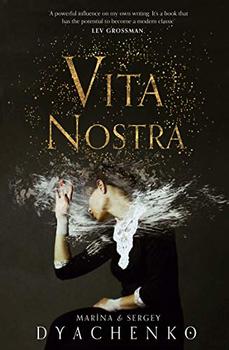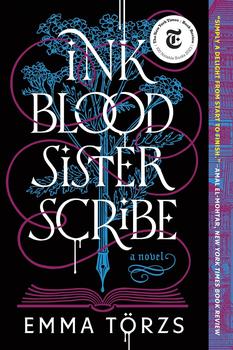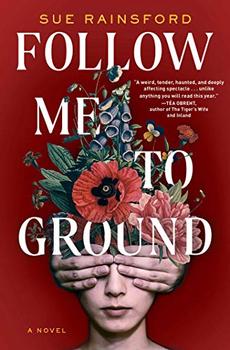Summary | Excerpt | Reviews | Beyond the book | Read-Alikes | Genres & Themes | Author Bio

Vita Nostra by Ukrainian authors Sergey and Marina Dyachenko is one of those novels that defies description. One might call it speculative fiction or magical realism, but those categories don't really capture the character of the book. Words that come to mind are more along the lines of surreal, fantastic and sinister. It was first published in Russian in 2007 and is the first in the authors' "Metamorphosis" cycle.
17-year-old Sasha is on a vacation with her mother when she encounters a mysterious stranger who makes bizarre demands of her. Although she refuses at first, she ultimately finds that her attempts to resist are useless. She meets the man again after she returns home, and with his reappearance come further commands, eventually culminating in the demand that after graduation she enroll at the "Institute of Special Technologies" – not the school she was intending to attend, nor one she's ever heard of. There, she discovers a talent she didn't know she possessed, becoming a star pupil but losing herself in the process.
The novel is extremely dark, and even frightening; Julia Meitov Hersey's stellar translation imbues the narrative with a sense of danger from the very start and never lets up. On the first day of school Sasha's class is told by a professor:
To everyone who puts their best effort into the process of learning and does his or her absolute best, I will guarantee: by the time the process is completed, these students will be alive and well. However, negligence and indifference bring students to a sorry end. An extremely sorry end. Understood?
It is compulsively readable and has a truly Russian feel to it; little details like sharing an apartment with strangers while on vacation or waiting in line to make a phone call immediately let the reader know the action likely isn't set in a Western country. Its stress on discipline and obedience further lend a foreign feel.
Comparisons with J.K. Rowling's Harry Potter novels are inevitable; a young person with exceptional but unexplored aptitude is sent to an unknown school where teachers see her gifts and teach her to use them; but this is definitely a book geared toward an older audience. Although Sasha is remarkable in many ways, she's also a typical college student away from home for the first time, and consequently the plot contains scenes that are likely too mature for young teen audiences. Also, I found much of the story disturbing in a way I haven't experienced since I first encountered Stephen King's writing decades ago, and can definitely imagine it inducing nightmares.
What exactly is expected of Sasha and her peers and what they will ultimately become is shrouded in mystery and metaphysics for much of the novel, and even as revelations are made, they are, to some extent, abstruse. In addition, the technology required to obtain the skills they learn is described in detail, and although these passages may make sense to the more mechanically minded reader, they may frustrate those who like to clearly understand every sentence of a book. I tried puzzling these out but quickly gave up, opting instead to just "go with the flow."
Vita Nostra most reminded me of Mikhail Bulgakov's masterpiece, The Master and Margarita, and those who enjoyed that book will very likely love this one. Frankenstein also came to mind as I read along. It will appeal most to those who enjoy Russian fiction and novels that contain fantastical elements.
![]() This review was originally published in The BookBrowse Review in November 2018, and has been updated for the
January 2020 edition.
Click here to go to this issue.
This review was originally published in The BookBrowse Review in November 2018, and has been updated for the
January 2020 edition.
Click here to go to this issue.

If you liked Vita Nostra, try these:

by Emma Torzs
Published 2024
In this spellbinding debut novel, two estranged half-sisters tasked with guarding their family's library of magical books must work together to unravel a deadly secret at the heart of their collection - a tale of familial loyalty and betrayal, and the pursuit of magic and power.

by Sue Rainsford
Published 2021
A haunted, surreal debut novel about an otherworldly young woman, her father, and her lover that culminates in a shocking moment of betrayal - one that upends our understanding of power, predation, and agency.
Your guide toexceptional books
BookBrowse seeks out and recommends the best in contemporary fiction and nonfiction—books that not only engage and entertain but also deepen our understanding of ourselves and the world around us.